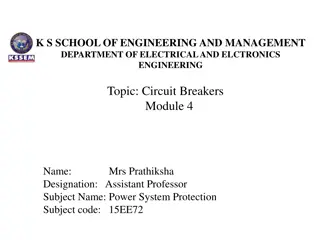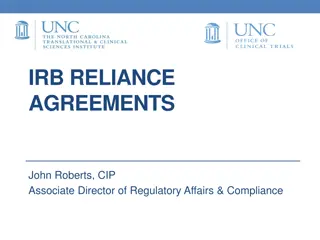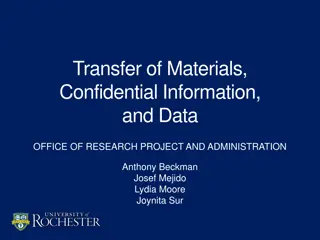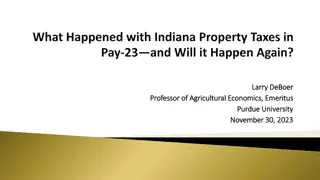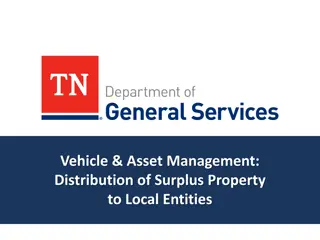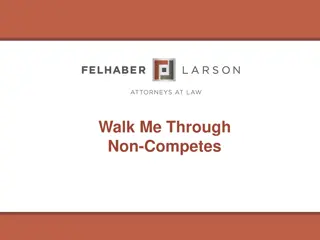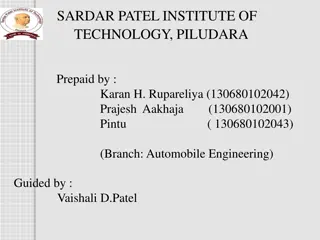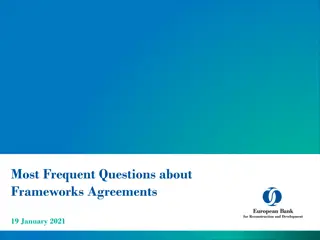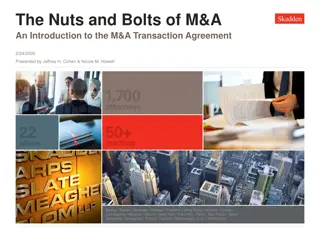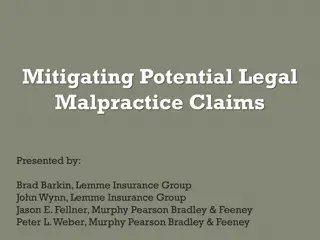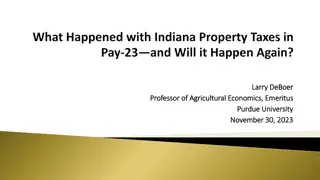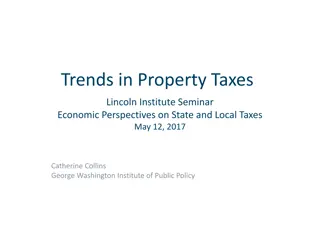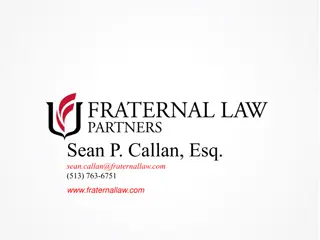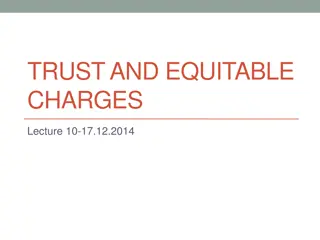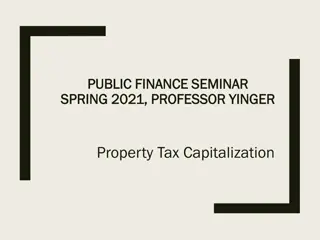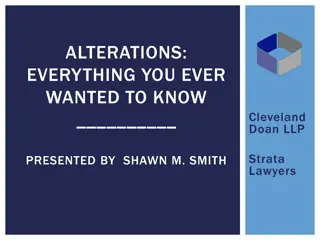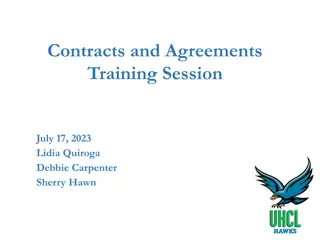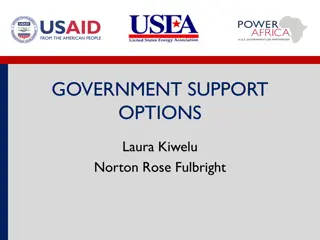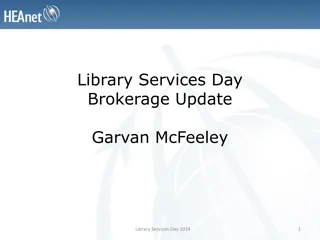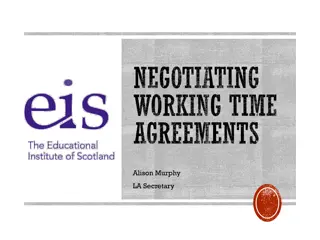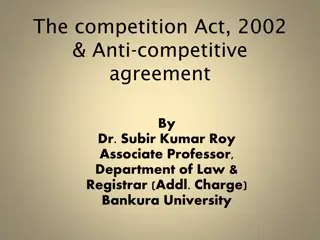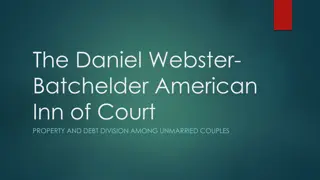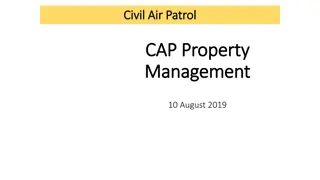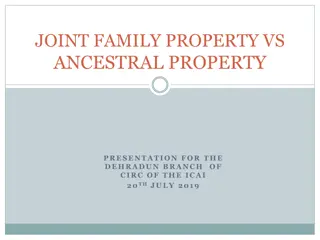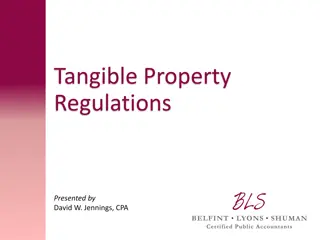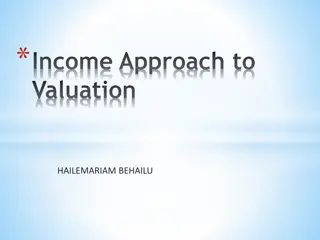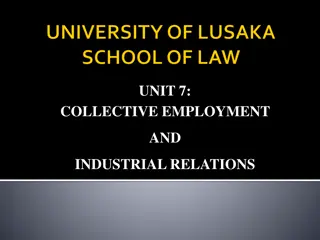Understanding Heads of Terms and Deal Breakers in Property Management Agreements
Exploring the crucial aspects of Heads of Terms (HoTs) in property deals, uncovering deal-breaker terms that can impact negotiations, and emphasizing the importance of clarity and understanding for both landlords and tenants. The content delves into the complexities of property agreements and the significance of thoroughness in drafting terms to avoid complications during the legal documentation phase.
Download Presentation

Please find below an Image/Link to download the presentation.
The content on the website is provided AS IS for your information and personal use only. It may not be sold, licensed, or shared on other websites without obtaining consent from the author. Download presentation by click this link. If you encounter any issues during the download, it is possible that the publisher has removed the file from their server.
E N D
Presentation Transcript
Whats What s HoT s HoT s & What s Not & What s Not PMA & SAS SEMINAR 1 NOVEMBER 2022
WHATS HoTs & WHATS NOT We can t live with HoT s & We can t live without them HoT s are used for almost every deal lettings, acquisitions, surrenders, regears, lease renewals. Every effort is made to cover the critical terms in HoT s to ensure the deal goes through on the agreed terms BUT problems still arise as soon as solicitors start drafting the documents Are they to blame or is it us? Where does it go wrong?
Which terms are deal breakers? Which terms are preferred but not deal breakers? Every landlord and landlord s agent and every tenant and tenant s agent SHOULD know what basic terms can be agreed in HOT s and which terms cannot be agreed because they are deal- breakers However, whilst landlords and retailer in-house surveyors know what their company will agree and will not agree in HOT s their agents often do not know The focus is invariably on getting the basic terms agreed with preferred wordings of other lease clauses a secondary consideration Ideally before HOT s are in an agreed form each side should check which terms might be deal breakers for their side YES this requires extra work but it should be a time saver avoiding protracted to-ing and fro-ing between landlords and tenants solicitors
HEADS OF TERMS THE PROPERTY Unit XX Shopping Centre or Retail Park - or XX Street LANDLORD Name & Registered Office & contact details LANDLORD S AGENT Name & contact details TENANT Full Name (& trading name) Registered Office & COMPANY REGISTRATION NUMBER GUARANTOR If one is required TENANT S AGENT Name & contact details MANAGING AGENT Name & contact details DEMISE All that property known as XXX as identified on Land Registry complaint plan HOWEVER for a new build say for example a DRIVE-THRU more detail is required
DEMISE FOR A DRIVE DEMISE FOR A DRIVE- -THRU THRU For a Drive-Thru site it is necessary to identify the land to be demised as this may define the tenant s liabilities for repairs and service charge particularly if it adjoins other properties on a Retail Park (see attached plan) If the demise excludes immediately adjoining landscaping tenant will have the right to uprate it at tenants cost Where this is a new build (modular or design & build) there are other important HoT s to include - see later
LEASE TERMS LEASE TERMS TERM XXXX years Inside L&T Act 1954 OR contracted out of L&T Act 1954? TERM COMMENCEMENT Either specified date or upon completion of the lease? RENT XXX per annum OR rising rent OR base rent plus turnover top-up What %age Gross / Net excl VAT TURNOVER RENT A key point to consider is how turnover is defined. Does this include online sales or just restricted to the premises? Does this exclude bad debts and keep turnover just to sums received ? Click & Collect included? RENT INCL SERVICE CHARGE Becoming more common does it provide for increase in s/charge without drop in rent? What happens at rent review what figure rent or rent incl s/charge is reviewed RENT INCL S/CHARGE & RATE (Insurance?) All inclusive rent. Does L/L get higher net rent if rates payable fall? RENT FREE PERIOD XXX months either from lease term commencement date or if earlier handover date RENT DEPOSIT If a rent deposit is required who holds the money who collects the interest on the money?
LEASE TERMS Break Option LEASE TERMS Break Option Tenant only OR Mutual (if lease contracted out) BREAK OPTION E.G. Tenant only break on the xth anniversary of the term subject to 6 months prior written notice Conditions All rent, service charge and insurance payments made Vacant possession no sub-tenancies in place > If mutual break specify date for landlords notice or from when rolling breaks apply Break penalty (if applicable) In exercising tenant only break tenant would seek repayment of any overpaid sums Marks and Spencer plc v BNP Paribas Securities Services Trust Company (Jersey) Limited when negotiating terms of a lease, where a break is conditional on payment of rent, a tenant should ensure that either (1) the break date falls the day before the quarter date; or (2) the lease contains an express provision requiring a landlord to refund the rent from the break date to the end of the quarter.
LEASE TERMS LEASE TERMS ALTERATIONS The Landlord s prior written consent (not to be unreasonably withheld) is required for any external signage. The lease will contain an absolute restriction on structural alteration The Tenant is permitted to carry out internal non-structural alterations with the Landlord s consent not to be unreasonably withheld. ALIENATION Assignment of sub-letting of the whole will be permitted subject to Landlord s consent, such consent not to be unreasonably withheld or delayed. The lease will contain an obligation on the outgoing tenant to provide an Authorised Guarantee Agreement where reasonably required. Any sub-lease will contain an absolute bar on further sub-letting Any sub-lease will be contracted out of the Security of Tenure Provisions of the Landlord and Tenant Act 1954. PRE-EMPTION If the Tenant wishes to assign the Lease the Landlord will have a pre-emptive right to take a surrender. At the same premium? Is this onerous? NO Removes AGA liability
Handover Specification Landlord s Works These need to be carefully recorded in a schedule (+ specification / plans) Tenant s Works These need to be carefully recorded in a schedule (+ specification / plans) What is the status of the property to be let? Fitted? Does the subject property have previous tenants fixtures and fittings (F&F) in situ? Is landlord (L/L) required to strip out all or just specific items OR is tenant to do these works Will L/L carry out strip out works (if via managing agents normally very expensive) OR will tenant receive payment to strip out? Shell? There is no universally agreed definition of what constitutes a shell property. Capped off services? Specification of shell (or enhanced shell) needs to be carefully recorded in HoT s (see later the Capital Allowances Tax and VAT implications)
DRIVE-THRU New Build Extra HoTs PLANNING The grant of the lease is conditional on: The Tenant / the Landlord obtaining satisfactory detailed planning consent for the development. [Where planning submitted by Landlord: The Landlord will submit the application within X weeks of agreement of heads of terms. The application must be reviewed and approved by the tenant and their planning consultants and highways consultants prior to submission.] PLANNING CONDITIONS Planning permission will be satisfactory if it permits the development [and signage] applied for and there are no unsatisfactory conditions imposed in the consent or in any necessary planning agreement. [tenant is to have absolute discretion as to the acceptability of any planning conditions or tenant will supply a list of planning conditions deemed to be acceptable, with further conditions being subject to tenants reasonable discretion.] APPEAL Tenant has the right to appeal if necessary, but at its absolute discretion. GOOD FAITH? If the landlord has made the planning application the Landlord can appeal only with the tenant s consent in its absolute discretion and must appeal if required to do so by the tenant. LONG STOP / DROP DEAD DATES Either party may terminate if the planning condition is not satisfied within [ie, 18] months of exchange. This longstop will be extended by an appeal, judicial review or non-determination but no later than an ultimate longstop date of [ie,36] months after exchange.
COVID RENT SUSPENSION Some L/L s will accept a rent suspension clause some won t. At lease renewal under the L & T Act 1954 the position is unclear. In WH SMITH RETAIL HOLDINGS LIMITED v COMMERZ REAL INVESTMENTGESELLSHAFT MBH (2021) the Court judgement made provision in the lease for a rent suspension clause (50% rent & full service charge) BUT the parties had agreed the principle of a rent suspension - albeit at differing levels. In POUNDLAND LTD V TOPLAIN LTD (2021) Poundland sought a clause providing for a 50% reduction of rent & service charge for pandemic scenario. The Court judgement followed established case law O May v City of London Real Property Co Ltd [1983] 2 AC 726. Judge found that it would not be fair and reasonable to impose on the landlord a sharing of the risk in circumstances over which the [landlord] would have no control whilst the [tenant] may have some by reference to reliefs or schemes that might be available to them by the government .
COVID RENT SUSPENSION Typical wording (tenant friendly) During any Suspension Period, the Principal Rent will be reduced by 50% from and including the date that the Suspension Period began until the end of the Suspension Period (apportioned pro rata). Suspension Period means any period in which a non- essential retailer (for example, a retailer who was not a type listed in part 3 of schedule 2 of the Health Protection (Coronavirus, Restrictions) (England) Regulations 2020) could not open the Premises for business COVID 19 (or any subsequent strain of it), including compliance by the Tenant and/or its staff with advice and/or guidance from the UK Government, the National Health Service or other health or regulatory bodies in relation to COVID19 (or any subsequent strain of it); or any other epidemic, public health emergency or communicable disease outbreak (whether local national or international). During any Suspension Period the Tenant shall not be required to perform any covenant requiring physical presence at the Premises including repair obligations, or to keep open shall not be considered to be in breach of any obligation to do so PROVIDED all covenants shall be complied with. In the Poundland case the Judge rejected these additional tenant requests.
USECLASS A or CLASS E Do you opt for Class A under the old original A1 use (Use Classes Order 1987) or Class A under Use Classes Order 1987 as amended pre-1stSeptember 2020 or Class E as introduced 1stSeptember 2020 SHOW OF HANDS PLEASE Class A1. Shops (Original Use Classes Order 1987 before subsequent amendments) Use for all or any of the following purposes (a) retail sale of goods other than hot food, (b) post office, (c) sale of tickets or as a travel agency, (d) sale of sandwiches or other cold food for consumption off the premises (e) hairdressing, (f) direction of funerals (g) display of goods for sale, (h) hiring out of domestic or personal goods or articles, (i) reception of goods to be washed, cleaned or repaired where the sale, display or service is to visiting members of the public NB Any of paras (a) to (i) can be deleted Is UCO 1987 amendment date the date of the lease or the date you are considering it ie, a review date or lease renewal date ?
USE USE CURRENT Class E (Commercial, Business and Service): Use, or part use, for all or any of the following purposes (a) for the display or retail sale of goods, other than hot food, principally to visiting members of the public, (b) for the sale of food and drink principally to visiting members of the public where consumption of that food and drink is mostly undertaken on the premises, (c) for the provision of the following kinds of services principally to visiting members of the public (i) financial services, (ii) professional services (other than health or medical services), or (iii) any other services which it is appropriate to provide in a commercial, business or service locality, (d) for indoor sport, recreation or fitness, not involving motorised vehicles or firearms or use as a swimming pool or skating rink, principally to visiting members of the public, (e) for the provision of medical or health services (f) for a creche, day nursery or day centre, not including a residential use (i) an office to carry out any operational or administrative functions, (g) for (ii) the research and development of products or processes, or (iii) any industrial process
USE USE By accepting a general Class E a standard former Class A use would now permit restaurant, office, industrial, medical & gym uses This might allow higher rents to be applied at rent review. NB Any paras in Class E can be deleted A standard user clause in HoT s The use for the sale of jewellery and related ancillary items within Use Class E of the Town & Country Planning (Use Classes) Order 1987 (as amended) It is often the case that the heads of terms will say: full user clause to be provided The recommendation is that the full user clause be included in the HoT s Anecdotal example User Clauses can change dramatically over time e.g. TK Maxx and Poundland
GREEN LEASES At present, real estate is responsible for 40 per cent of global annual CO2 emissions and 40 per cent of natural resource use. At the typical rate of redevelopment, 80 per cent of buildings standing today will still be in use in 50 years time. We cannot solely focus on design and construction so seek more sustainable long-term solutions for existing properties. One such solution is the implementation of green leases. A GREEN LEASE seeks to incorporate environmental clauses which place an obligation on both the landlord and the tenant to provide for the management and improvement of the environmental performance of a building. Examples of green clauses include: Energy efficiency measures Waste reduction / management measures Water efficiency regimes Drafting which ensures that alterations and repairs are carried out using sustainable materials Enhancing transport facilities such as bike racks and showers Rights for the landlord or the tenant to carry out works which enhance environmental performance
ESG ESG stands for environmental , social and governance , E: Environmental factors consider aspects such as the energy efficiency and emissions of buildings. S: Social factors include considerations around how properties impact society, for example the health and wellbeing of occupiers and the local community. G: Governance factors cover aspects such as diversity, culture, and reputation and, in a real estate context, may apply to both the ultimate property owner, as well as the occupiers, and any management companies and on-site staff. Funds REITS larger Prop Co s and the bigger retailers committed to ESG policies BUT can they impose on/apply it existing properties?
ESG ESG It is becoming the case that some L/L s have no choice on adoption of ESG Real estate sector subject to evolving wave of new legislation as the government continues to respond to ESG-related issues. Government s Green Finance Strategy likely to require mandatory disclosures for certain companies including those in the real estate sphere ESG objectives achievable on new build or refurb of vacant property BUT NOT easily achieved on existing older property unless T is ESG minded Unless T has strong ESG policy it will resist ESG clauses in new leases if cost of implementation is dearer (when repairing or replacing fabric or M & E)
EPC EPC The obligation to meet MEES EPC requirements is the L/L s However attempts are made to transfer this liability to the tenant as for example below The lease prohibits the tenant from commissioning an energy performance certificate (EPC) for the property, unless required to do so by the EPC Regulations. The lease provides that where the tenant has a statutory obligation to commission an EPC, the tenant must (at the request of the landlord) either commission it from an Energy Assessor approved by the landlord or pay the landlord's cost of commissioning an EPC. The lease requires the tenant to deliver to the landlord a copy of any EPC that is obtained or commissioned by the tenant or any other occupier of the Property.
EXCLUSIVITY The Competition Act 1998 prohibited any restrictions which reduced competition in any industry or sector. However until 6th April 2011 property was exempted from this legislation. At that date the exemption was revoked. Accordingly from that date any restriction such as an exclusivity clause is effectively null & void at law Notwithstanding the legal position tenants demand & landlords agree to exclusivity clauses which are effectively anti- competitive. It is a question of the degree of anti-competitiveness should the CMA (Competition Markets Authority) have a case reported to them. In practice no one takes any notice of these provisions and no one wants to fight the legal argument. Consequently exclusivity clauses are still granted along the following lines:- The Landlord shall not let any other unit in the Centre to a retailer of (e.g. MOBILE PHONES). The exclusivity is for the sole benefit of and to be enforced only by the tenant. The exclusivity will cease to apply when the original tenant is no longer in occupation or ceases to use the premises for the permitted use. The exclusivity will not apply in relation to any tenant or occupier of the Centre who is permitted to use part of the Centre (or is subsequently allowed to change the use of part of the Centre under an existing lease or agreement for lease) in a manner which would otherwise contravene the exclusivity
UNINSURED RISK/DAMAGE This term is often a sticking point on new leases. It is commonly waived by L/L s on High Street or standalone properties BUT NOT in shopping centres Uninsured Damage occurs where all of these occur: (a) the Premises are damaged by a risk within the definition of Insured Risks and are unfit for occupation and use: (b) the damage is not insured, fully or at all, because: (i) insurance is not available at all or at economic rates in the London insurance market; or (ii) an Insurance exclusion applies: (c) the Landlord cannot recover the full cost of reinstatement (ignoring excesses and deductibles) under the insurance policy; and (d) the Landlord notifies the Tenant within six months of the date of the damage that it is Uninsured Damage, failing with it is treated as damage to the Premises by an Insured Risk. But Uninsured damage excludes any damage where ethe Landlord s insurance is vitiated by the Tenant, unless the Tenant pays the irrecoverable insurance money to the Landlord on demand. 1.1 Termination following Uninsured Damage 1.1.1 If there is Uninsured Damage (a) clause 5.3.2 applies as if there had been damage to the Premises by an Insured Risk; and (b) the Landlord may elect to reinstate the Premises by giving notice to the Tenant (an Election Notice) at any time after the date on which Uninsured Damage occurs
Confidentiality Non-Disclosure The Landlord (or Tenant) shall sign and return the Landlord s (or Tenant s) Disclosure Agreement (attached) within 5 working days of agreeing these Heads of Terms. standard Non- The Receiving Party shall hold all Confidential Information of the Disclosing Party in confidence and shall not disclose it to any person, entity or governmental body, or use it other than as permitted by this Agreement. The Receiving Party shall ensure that each Representative to whom Confidential Information is disclosed is aware of the obligations of confidentiality and maintains such confidentiality. The obligations as to confidentiality and non-disclosure in this Agreement do not apply to matters that are within the public domain (other than by reason of breach of the terms of this agreement) or are required by law or regulation to be disclosed.
LEASE TERMS Capital Contribution LEASE TERMS Capital Contribution CAPITAL CONTRIBUTION Where a tenant is to be given a capital contribution the wording of the provisions is critical. See example below where the L/L covers off all the points to ensure that he can secure Capital Allowances where applicable and not pay VAT where it is not applicable The Landlord / the Developer will pay the Tenant XXXX plus VAT (if applicable) by way of a contribution to the Tenant s Works. The Capital Contribution shall be allocated towards the Tenant s Works that qualify for capital allowances and thereafter towards the remainder of the Tenant s Works. The Tenant will be required to provide an invoice and a breakdown of Tenant Works paid for by the Capital Contribution. The Tenant must ensure that they are CIS registered if necessary. Any money owed to the Landlord/ the Developer by the Tenant at the time of payment will be offset against the Capital Contribution.
LEASE TERMS Capital Contribution LEASE TERMS Capital Contribution - - continued continued CAPITAL CONTRIBUTION The Capital Contribution will be payable (10 ) working days after the later of: The grant of the Lease The date on which the Premises opens for trade. The date on which the Tenant has completed the Tenant s Works to the satisfaction of the Landlord/ the Developer. The date of the provision of all information required under the AFL in relation to the Tenant s Works. The provision of valid invoices for the Capital Contribution addressed to the Landlord and the Developer. The provision by the Tenant to the Landlord and the Developer of a capital contribution breakdown.
LEASE TERMS Capital Contribution LEASE TERMS Capital Contribution - - Incentives Incentives The three most common forms of inducements, excluding contributions offered by landlords are: rent-free period; reduced rent; reverse premium (capital payment) The objective on both sides L/L and T is to do the best commercial deal possible but they may have a different tax status. Rent free It is not taxable and give rise to a VAT supply. Reduced rent - No tax issue arises Capital Contribution Reverse premium A reverse premium is generally a cash payment made from landlord to tenant at the start of a lease. This is normally taxable on the tenants A landlord, who is a property investor, does not obtain a deduction from rental profits for the payment of a reverse premium. This is because it is regarded as a capital payment being expenditure on (enhancing the value of) an identifiable asset, namely the landlord s own interest in the land. On disposal the landlord may be able to obtain a deduction for the reverse premium in its capital gains tax calculation. A lease inducement can escape being taxed as a reverse premium if it is taken into account in calculating the tenant s entitlement to capital allowances. To fall within this, the payment must be structured as a contribution by a landlord towards the tenant s cost of fitting out the property and the qualifying items therein.
LEASE TERMS Capital Contribution LEASE TERMS Capital Contribution - - Incentives Incentives A payment to an incoming tenant is generally outside the scope of VAT. But it may be consideration for a supply by the tenant, if the tenant is taking on obligations beyond those normally involved in taking a lease or is providing an additional benefit to the landlord capable of comprising a service in its own right, such as having the status of an anchor tenant. Anchor tenant is a term with different meanings in different contexts. The term is commonly understood to mean a company with a strong rental covenant signed up by a landlord wishing to let space in a large property to multiple tenants. Once an anchor tenant is in place, the landlord hopes others will follow. The anchor tenant is often given preferential terms, or is paid a large sum when entering into the lease. The definition for VAT purposes of an anchor tenant is especially relevant. The question is whether the tenant is providing more to a landlord than a firm promise of future rental payments and some good publicity.


